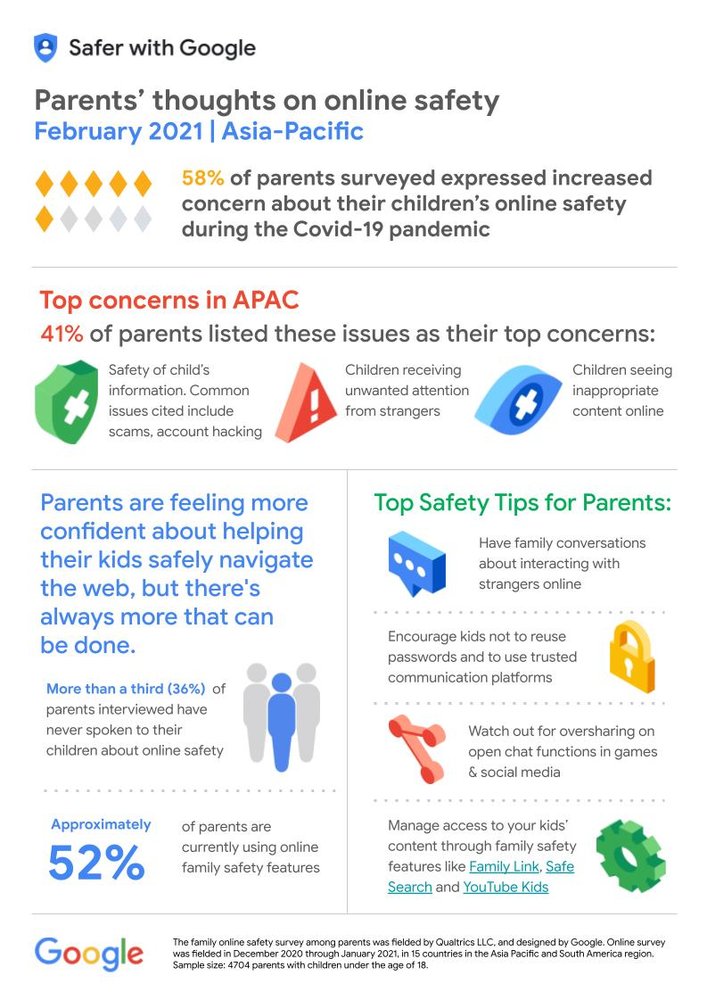Wear a mask, wash your hands, don’t reuse your password!
Parenting was especially challenging in 2020. Our families needed to learn new habits like social distancing, wearing masks and frequently washing our hands. As a large part of our everyday lives moved online, it was necessary to teach our children to take extra precautions as well.
I am part of a team at Google that teaches online safety habits to people from all walks of life. Parents have always been concerned for the digital safety of their families, and with online learning becoming the main mode of school for many, this might be even more of a concern.
We worked with our Trust Research team to survey parents all over Asia-Pacific (Australia, Hong Kong, India, Indonesia, Japan, Malaysia, the Philippines, Singapore, Taiwan, Thailand and Vietnam) and Latin America (Argentina, Brazil, Colombia and Mexico) and found that parents with children attending school online were more concerned about online safety than ones whose children attended school in-person.
As a father of three kids who use the internet in very different ways, instilling safe habits can be a challenge. So today, on Safer Internet Day, I would like to share some tips to address the top three parental concerns when it comes to keeping our children safe online.
1. Protect their digital identities.
The privacy and security of their children’s information was the top concern of parents we surveyed. Parents cited concerns around scams or hacking of their child’s accounts. Here are some simple ways to safeguard your kids’ information:-
Teach your children how to choose strong passwords that cannot be easily guessed. Avoid simple passwords that use names, birthdates or even favourite cartoon characters.
-
It is also useful to stick to platforms that have a strong reputation for user safety. For instance, using an email service like Gmail comes with built-in safety filters to detect phishing emails, blocking 99.9% of phishing attacks from ever reaching your inbox.

2. Know who they talk to.
Social isolation is a difficult outcome of the COVID-19 pandemic, and our children connect with their friends online, whether through messaging apps or voice chat while playing games. It is important for parents to be aware that these channels can also be used by ill-intentioned strangers to reach out to our children. Just as in real life, it is important to be aware of who our children talk to online.-
Try to talk to your kids about the games they play or the videos they watch, and also the people they play with online. I always remind my kids to come to me immediately if they face any situation online that makes them feel uncomfortable. More than 70% of parents in Asia-Pacific were not very confident that their children would come to them if they encountered unsafe situations online. In fact, more than a third of the parents we interviewed had never spoken to their children about online safety. We need to work hard to reassure our children that we are here to guide and protect them.
-
When assessing if a game is suitable for your child, it is important to check not only the content of the game, but also whether the app allows online communications with others. Some multiplayer games allow only a few options for social interaction, like a thumbs up rather than a text chat. This reduces risks of unwanted social interactions by quite a lot.
3. Offer appropriate content at the appropriate age.
The fear of children encountering inappropriate content has long been among the top concerns of parents in surveys. There are family safety features that parents can use to help guard their children from content that may not be suitable for their age. However, we learned that only about half (52%) of parents we surveyed are using these features. Here are some features that you can start using today:-
Turning on SafeSearch on Google helps filter out explicit content in Google’s search results for all searches, including images, videos and websites. SafeSearch is designed to help block explicit results like pornography from Google search results.
-
Manage your child’s device by creating a Google account for your child and using Family Link. This allows you to add filters on Google Search, block websites or only give access to the ones you allow or track the location of your child if they have their own device.
-
Many parental controls are available on YouTube Kids. You are able to limit screen time, only show videos that you approve or select suitable content based on the age of your child.
Some other time-tested tips include allowing children to use the internet only in common areas in the home such as the living room. But the tough part is leading by example!
I hope these tips are helpful for you and your families. If you are interested in learning more about online safety, you can also check out a new resource that we’ve launched together with the ASEAN Foundation: the ASEAN Online Safety Academy, where we have tips for parents and kids, as well as learning sessions on navigating topics such as misinformation or cyberbullying.
At the end of the day, the core of our parenting journey lies in the relationships we build with our children. They require our guidance on the internet as much as they do in the real world. Tiring as 2020, and now 2021, has been, I am grateful that I have had more time with my family and to appreciate what each of them brings to my life.
Let’s work together to make the internet a safe place for our children to learn, create and explore.
by Lucian Teo via The Keyword
Comments
Post a Comment